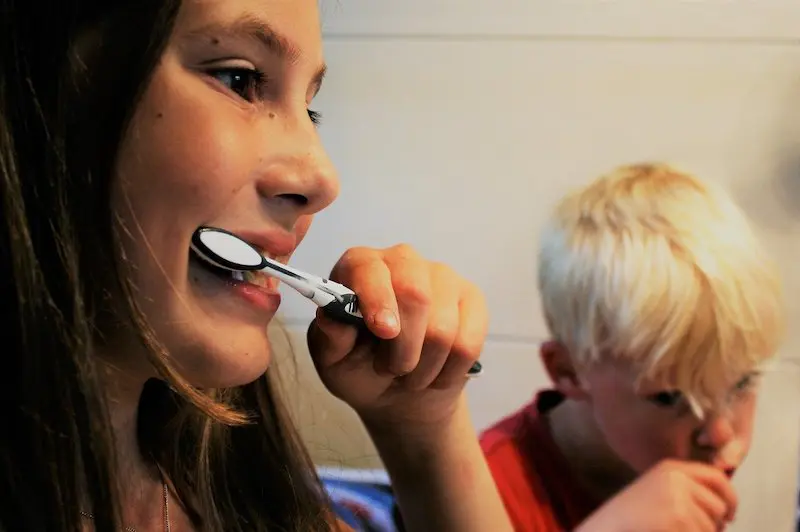It is impossible to know what life holds for every child, especially when it comes to inheriting traits from mom and dad. While we understand how genes influence features like eye color, height, and hair color, we cannot explain why some characteristics appear to run in families while others seem to appear randomly in the population.

(jennyfriedrichs / pixabay)
Explaining oral health in genetics alone leaves out key pieces to the puzzle that significantly impact the final picture. Inherited traits can make children more prone to develop the same dental issues that their parents. However, environmental, behavioral, and socioeconomic factors can significantly accelerate or hinder the expression of these genes and the diseases that they cause.
Oral Cancer
Many types of cancer are hereditary and oral cancer is no exception. If a parent or sibling has had one of the various types of oral cancer, you should watch for symptoms that may indicate a developing problem. However, the most significant risk factor for developing oral cancer is not your genetics. Your personal habits and choices play a much more substantial role. Tobacco and heavy alcohol use are the two most significant risk factors for oral cancer. Choosing not to use these products or to cut back significantly decreases your risk of illness and can positively affect your overall health in the process. In many cases, you can choose not to fall victim to this genetic disease.
Dental Caries
Dental professionals debate whether or not a propensity for dental caries, better known as cavities, is a genetic problem. Studies done on the matter vary greatly in their conclusions. Depending on which one you read, you may find that 20-85% of a person’s risk of developing caries is dependent on their genes. While they cannot yet agree on how much impact genetics has, there is an understanding that genetics are a factor to consider. Understanding the genetic component of this problem requires examining how the genes implicated in tooth decay influence oral health.
The genes most commonly associated with increased incidence of tooth decay are the same ones responsible for tooth development, maintenance, and repair within the body. Specifically, genes that affect your enamel composition and hardness, saliva production and pH, as well as tooth mineralization. If your body produces soft enamel or less saliva to wash away food debris, you likely have an increased risk of tooth decay.
The type of bacteria and balance of bacterial species in your mouth, known as the microbiome, also plays a significant role in developing caries. The bacteria that children have in the first years of life depends largely on genetic and inherited factors. However, as the child grows and is exposed to new bacteria and new foods, the balance of this flora changes significantly—the microbiome changes from an inherited trait to an environmental factor influencing their oral health.
If a child does have a natural propensity for tooth decay, proper oral care habits are vital. Sealants, regular cleanings, and fluoride treatments can help strengthen teeth and protect them from harmful bacteria. If problems persist, talk to your Weber County family dentist to see if prescription toothpaste or rinses could be part of the solution.
Gum Disease
While many dental specialists agree that 30-50% of the population is predisposed to develop gum disease, the role that genetics play in the equation may surprise you. There are no genes that will cause or prevent this type of infection. However, because overall health has a significant impact on the development of periodontal disease, genetic disorders can lead to gum disease.
The genes tied closely to gum disease are those responsible for periodontal structure, including oral tissue repair, tooth mineralization, bone construction, as well as those influencing the immune system’s response to imbalances in the oral microbiome. If your immune system does not properly react to or control invasive bacteria, infections are more likely to occur. These infections can lead to significant gum tissue damage and even bone loss. In most cases, the immune system, in conjunction with our own oral health routines, is enough to keep problems in check. However, cell and tissue damage is an unfortunate side effect of the process. Proper tissue repair and tooth remineralization are vital to preventing permanent damage. Any genetic deficiency that hinders this process can lead to significant problems.
The Bottom Line
Your children will undoubtedly inherit some of your traits for better or for worse. Whether or not that will include your oral health depends on the underlying cause of your dental problems. Oral health is not controlled exclusively by our genes. Despite genes that may cause weak tooth enamel, or limited saliva production, or a weak immune system, there are always steps that we can take to improve our ability to avoid infection and decay. Simple steps such as avoiding sugary snacks and drinks, brushing and flossing daily, and visiting the dentist twice a year can have more impact on your child’s dental health than the poor genetics they may inherit.
